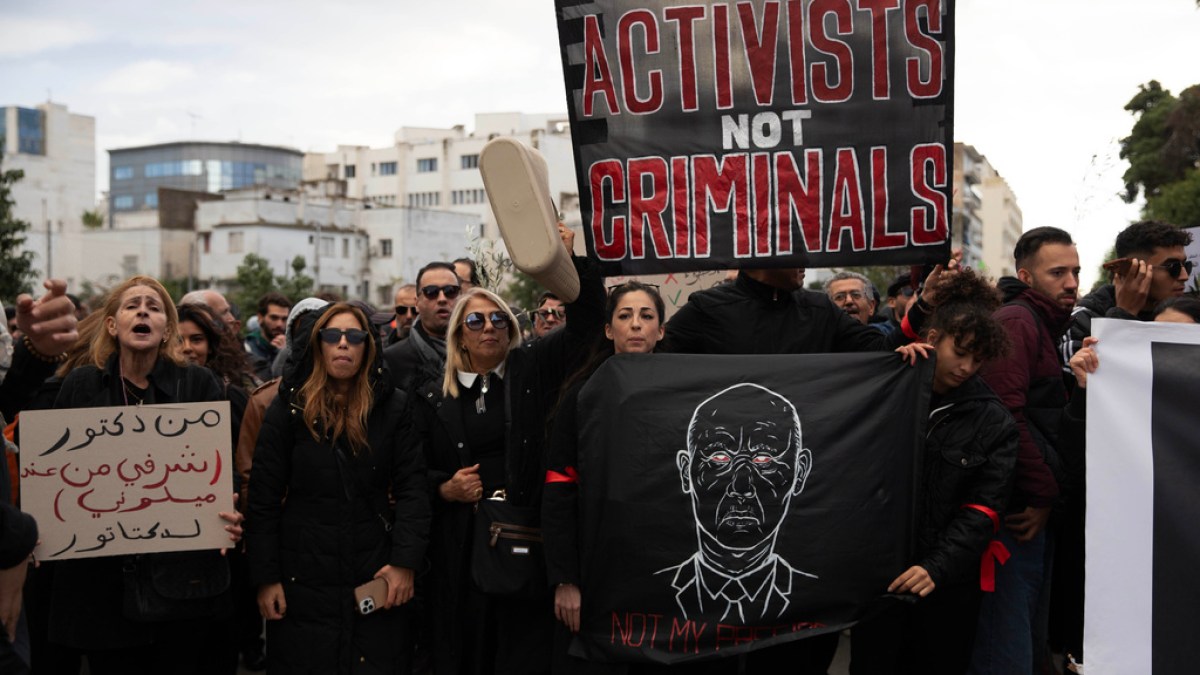Thousands Rally in Tunis Against President Saied's Authoritarian Grip
Tunis, Tunisia – Thousands of Tunisians poured onto the streets of the capital on Saturday, November 22, to voice their vehement opposition to President Kais Saied's increasingly authoritarian rule and the widespread crackdown on government critics. The demonstration, marked by chants of "the people want the fall of the regime" and "no fear, no terror, the street belongs to the people," underscored a growing national discontent.
A United Front Against Repression
Estimates suggest at least 2,000 protesters, many donning black and carrying whistles and red ribbons, marched through Tunis. Placards bearing defiant messages like "Enough repression" and "Not my president" highlighted the frustration. This rally, themed "against injustice," represented a rare moment of unity among a diverse array of activists, non-governmental organizations, and fragmented opposition parties, all coalescing against Saied's policies. The protest follows a Tunisian court's recent five-year prison sentence for former administrative judge Ahmed Souab, a prominent critic of judicial politicization.
Speaking to Al Jazeera, Tunisian journalist Said Zouari noted this newfound solidarity among groups of varying ideological backgrounds. However, he cautioned that these protests appear to be unheeded by the presidential residence, Carthage Palace.
Mounting Crackdown on Dissent
The Tunisian government has systematically jailed dozens of opposition figures, journalists, lawyers, and businesspeople, alleging "conspiring against state security." Critics, however, argue that President Saied is weaponizing the judiciary and police to silence political opponents. They warn that the democratic advancements made since the 2011 revolution, which toppled Zine El Abidine Ben Ali and ignited the Arab Spring, are rapidly eroding.
"All the progress of the past 14 years has been overturned," asserted Ayoub Amara, one of the protest organizers. "Tunisia is big enough for all Tunisians, and no single person can rule it according to his whims." Monia Brahim, whose husband, opposition figure Abdelhamid Jlassi, is currently jailed, emphasized her participation was to "defend my rights as a citizen." She stated that political prisoners are "paying the price for their principles" and are "being held hostage by the regime." Among the detained, constitutional law professor Jaouhar Ben Mbarek has been on hunger strike for over 20 days.
Broader Wave of Dissatisfaction
Saturday’s march is part of a larger surge of protests sweeping the nation, fueled by mounting political and economic turmoil under Saied’s leadership. Just days prior, Tunisian journalists protested against a widening clampdown on press freedom and the temporary suspension of several prominent civil society organizations.
President Saied, democratically elected in 2019, controversially suspended parliament and consolidated all branches of power in 2021. Since then, he has relentlessly pursued political opponents and former officials. Initially, his crackdown targeted the Ennahdha Party, a key component of the previous governing coalition under Beji Caid Essebsi. Ennahdha leader and former Parliament Speaker Rached Ghannouchi has received multiple jail sentences in cases his supporters deem politically motivated. Even Saied’s former allies haven't been spared; Nadia Akacha, his influential former chief of staff, was sentenced to 35 years in prison in absentia in July.
International Rights Groups Raise Alarm
Concerns about Saied’s actions extend to international human rights organizations. Amnesty International recently highlighted the "critical levels" of suppression targeting civil society, citing arbitrary arrests, detentions, asset freezes, banking restrictions, and suspensions against 14 NGOs. Human Rights Watch corroborated these concerns, reporting that over 50 individuals, including politicians, lawyers, journalists, and activists, have faced arbitrary arrest or prosecution since late 2022 for exercising fundamental rights. Both groups warn that broad anti-terrorism and cybercrime laws are being misused to criminalize dissent and stifle free speech.
Despite these accusations, Saied consistently denies any dictatorial intentions or using the judiciary against opponents, maintaining that his actions are aimed at "cleansing Tunisia of 'traitors'."

